Phil 347 week 2 quiz Study guides, Class notes & Summaries
Looking for the best study guides, study notes and summaries about Phil 347 week 2 quiz? On this page you'll find 64 study documents about Phil 347 week 2 quiz.
All 64 results
Sort by
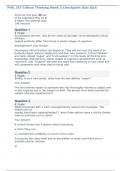 Popular
Popular
-
PHIL 347 Critical Thinking Week 3 Checkpoint Quiz Q&A
- Exam (elaborations) • 6 pages • 2023
-
- $9.99
- 1x sold
- + learn more
PHIL 347 Critical Thinking Week 3 Checkpoint Quiz Q&A Score for this quiz: 48 out of 50 Submitted May 24 at 6:04pm This attempt took 149 minutes. According to the text, how do the views of stronger, more developed critical thinkers toward authority differ from those in earlier stages of cognitive development? Your Answer: Developed critical thinkers are skeptical. They will not trust the word of an authority figure without skepticism and their own research. Critical Thinkers are likely r...
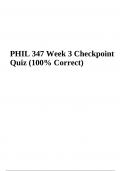 Popular
Popular
-
PHIL 347 Week 3 Checkpoint Quiz (100% Correct)
- Exam (elaborations) • 5 pages • 2023 Popular
-
Available in package deal
-
- $15.49
- 1x sold
- + learn more
PHIL 347 Week 3 Checkpoint Quiz (100% Correct). According to the text, how do the views of stronger, more developed critical thinkers toward authority differ from those in earlier stages of cognitive development? (pg. 116 - 117) Our text explains that folks in the earlier stages of cognitive development view authority as someone who is powerful and capable of controlling others' behavior, or as someone trustworthy, who can offer good advice (Facione & Gittens, 2016). For example, parents an...
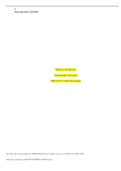
-
PHIL 347 Critical Reasoning (Entire Course Week 1 – 8) BUNDLE | 100% Guaranteed
- Package deal • 18 items • 2022
-
- $19.49
- 2x sold
- + learn more
PHIL 347 Week 1 Assignment: Journal PHIL-347 Week 1 Course Project: Topic Selection PHIL 347 Week 1 Discussion: Wisdom vs. Knowledge (With Replies) PHIL 347 Week 2 Assignment: Journal PHIL-347 Week 2 Checkpoint Quiz (100% Correct) PHIL 347 Week 2 Discussion: Context, Meaning, and Value – Option 1: California Washington Mural (With Replies) PHIL-34
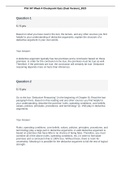
-
Phil 347 Week 4 Checkpoint Quiz (Dual Version)_2023
- Exam (elaborations) • 10 pages • 2023
-
- $8.72
- 1x sold
- + learn more
Question 1 5 / 5 pts Based on what you have read in the text, the lecture, and any other sources you find helpful to your understanding of deductive arguments, explain the structure of a deductive argument in your own words. Your Answer: A deductive argument typically has two premises and a conclusion based on those premises. In order for the conclusion to be true, the premises must be true as well. Therefore, if the premises are true, the conclusion will certainly be true. Deductive re...
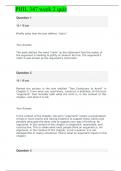
-
PHIL 347 week 2 quiz
- Exam (elaborations) • 4 pages • 2023
- Available in package deal
-
- $10.49
- + learn more
PHIL 347 week 2 quiz Briefly state how the text defines “claim.” Your Answer: The book defines the word "claim" as the statement that the maker of the argument is seeking to justify or show to be true. The argument's claim is also known as the argument's conclusion. Reread the section in the text entitled “Two Confusions to Avoid” in Chapter 5. From what you read there, construct a definition of the term “argument” that includes both what the t...
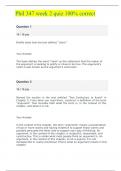
-
Phil 347 week 2 quiz 100% correct
- Exam (elaborations) • 5 pages • 2023
-
- $7.99
- + learn more
Briefly state how the text defines “claim.” Your Answer: The book defines the word "claim" as the statement that the maker of the argument is seeking to justify or show to be true. The argument's claim is also known as the argument's conclusion.
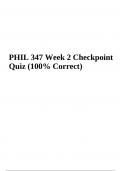
-
PHIL 347 Week 2 Checkpoint Quiz (Verified 2023/2024)
- Exam (elaborations) • 4 pages • 2023
- Available in package deal
-
- $12.49
- + learn more
PHIL 347 Week 2 Checkpoint Quiz (Verified 2023/2024).What are the component premises are there in the following statement: "If it weren’t for how much it costs and how big it is, I’d buy that TV for our bedroom." Your Answer: The first premise of the following statement is that the TV is very expensive and the person cannot afford it. The second premise is that the TV is very big and would not fit in the bedroom of the person who wants to purchase it. Question 4 10 / 10 pts Go to t...
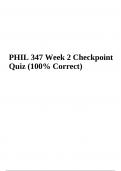
-
PHIL 347 Week 2 Checkpoint Quiz (100% Correct)
- Exam (elaborations) • 4 pages • 2023
-
Available in package deal
-
- $15.49
- + learn more
PHIL 347 Week 2 Checkpoint Quiz (100% Correct). Briefly state how the text defines “claim.” Your Answer: The book defines the word "claim" as the statement that the maker of the argument is seeking to justify or show to be true. The argument's claim is also known as the argument's conclusion. Reread the section in the text entitled “Two Confusions to Avoid” in Chapter 5. From what you read there, construct a definition of the term “argument” that includes both what the ter...
PHIL 347 Week 2 Checkpoint Quiz (Verified 2023/2024) & PHIL 347 Week 3 Checkpoint Quiz
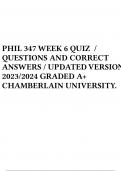
-
PHIL 347 WEEK 6 QUIZ / QUESTIONS AND CORRECT ANSWERS / UPDATED VERSION 2023/2024 GRADED A+ CHAMBERLAIN UNIVERSITY.
- Exam (elaborations) • 13 pages • 2023
-
- $8.49
- + learn more
PHIL 347 WEEK 6 QUIZ / QUESTIONS AND CORRECT ANSWERS / UPDATED VERSION 2023/2024 GRADED A+ CHAMBERLAIN UNIVERSITY. Week 6 Checkpoint Quiz Due Feb 15 at 1:59am Points 100 Questions 14 Available Feb 7 at 1:59am - Feb 15 at 1:59am 8 days Time Limit None Instructions Required Resources Read/review the following resources for this activity: Textbook: Chapter 12, 14 Lesson Instructions The checkpoint quizzes are short assessments that will check your unders...
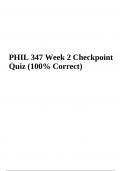
-
PHIL 347 Week 2 Checkpoint Quiz 2023/2024 | 100% Correct
- Exam (elaborations) • 4 pages • 2023
- Available in package deal
-
- $12.49
- + learn more
PHIL 347 Week 2 Checkpoint Quiz 2023/2024 | 100% Correct. What questions does the text suggest we ask to distinguish conclusions and reasons? Your Answer: The text suggests several questions that we may ask to distinguish between conclusions and reasons. The first question that the text suggests we ask is, "What is the conclusion that the speaker is trying to establish as true?" According to the text, a question we may ask instead of the first question is, "What is the decision that the...

Did you know that on average a seller on Stuvia earns $82 per month selling study resources? Hmm, hint, hint. Discover all about earning on Stuvia


